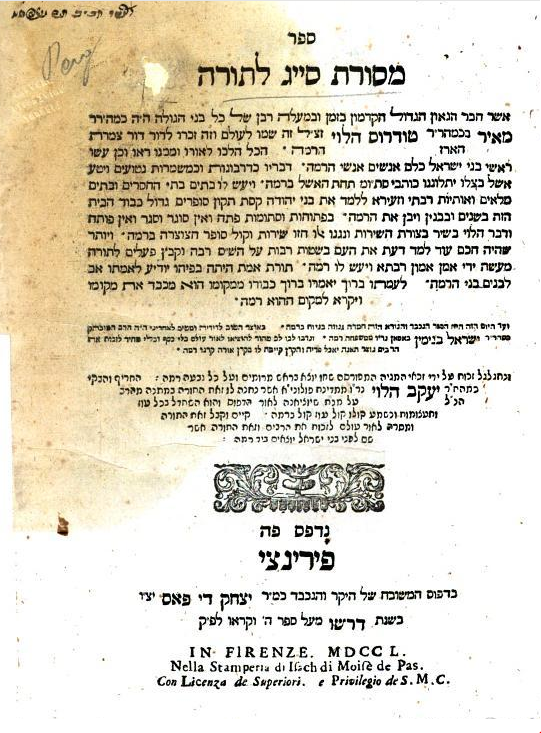(Cross-posted to Girsology.)
There is a girsological error in parshat Shofetim in my Mikraos Gedolos, in the second pasuk of the parsha. The pasuk (Devarim 16:19) reads:
While this reads צַדִּיקִים, it should read צַדִּיקִם, without the second yud. The reason I say this is the following comment from Minchas Shai:
Since we have access to Codex Hilleli (pg 475), we can see this very spelling of צַדִּיקִם, and this very Masoretic note, as a Masoreh Ketanah:
As far as I can tell, the full text of the masoretic note does not appear as stated by Minchas Shai, at least here. I think it reads:
And an identical Masoretic note.
The Leningrad Codex has identical deficient spelling:
Namely, on pg 223:
So too the Teimanim. To cite Mechon-Mamreh:
Rabbi Meir Abulafia (1170-1244), the Rama, wrote about this phenomenon in the sefer Masores Seyag Lachochma:
The note itself, which only highlights the phrase וִיסַלֵּף דִּבְרֵי צַדִּיקִים, is ambiguous, in that perhaps it refers to the phrase in Mishpatim, perhaps in Shofetim, or perhaps in both. But assuming it is from the Rama himself, then it is unambiguous.)
Looking at Vetus Testamentum (pg 217) to see what the Samaritans have, we should not be surprised that they have both yuds. This is characteristic of the Samaritan text, to eliminate any awkward and unregularized spelling. The Samaritan text is on the left:
On the bottom of the page is a listing of variant manuscripts. Interestingly enough, there appear some Samaritan manuscripts in which the first yud is missing, as צדקים! For the Hebrew (meaning Jewish, rather than Samaritan), there is only one such צדקים, and a large number of instances of צדיקים:
There is a girsological error in parshat Shofetim in my Mikraos Gedolos, in the second pasuk of the parsha. The pasuk (Devarim 16:19) reads:
While this reads צַדִּיקִים, it should read צַדִּיקִם, without the second yud. The reason I say this is the following comment from Minchas Shai:
"צַדִּיקִם -- In He'etek Hilleli and in all the precise sefarim it is missing the second yud. And so too in the Masores: In the entire Torah, it [the word צַדִּיקִם] is deficient in the second yud, except for one case, which is plene and plene [in that both yuds are present], namely וִיסַלֵּף דִּבְרֵי צַדִּיקִים of parshat Mishpatim, [Shemos 23:8It is understandable how the yud was introduced here as a typographical error, rather than relying on a Masorah from one of the not-so-precise sefarim. The more common spelling of all masculine plurals in Biblical Hebrew is with the yud in the ים suffix. While there are plenty of words which are chaser [deficient] yud or vav, it is not so common in the morphological endings. Also, the very phrase in question, וִיסַלֵּף דִּבְרֵי צַדִּיקִים, appears elsewhere malei [plene].
]
You shall not accept a bribe, for a bribe will blind the clear sighted and corrupt words that are right. ח. וְשֹׁחַד לֹא תִקָּח כִּי הַשֹּׁחַד יְעַוֵּר פִּקְחִים וִיסַלֵּף דִּבְרֵי צַדִּיקִים:
as I wrote in parshas vaEschanan."
Since we have access to Codex Hilleli (pg 475), we can see this very spelling of צַדִּיקִם, and this very Masoretic note, as a Masoreh Ketanah:
As far as I can tell, the full text of the masoretic note does not appear as stated by Minchas Shai, at least here. I think it reads:
כל אורייתא חסר בר מן א' מלא
"The entire Torah has it [the second yud] deficient, except for one which is plene."So too the Lisbon Codex (pg 368):
And an identical Masoretic note.
The Leningrad Codex has identical deficient spelling:
Namely, on pg 223:
So too the Teimanim. To cite Mechon-Mamreh:
| טז,יט לֹֽא־תַטֶּ֣ה מִשְׁפָּ֔ט לֹ֥א תַכִּ֖יר פָּנִ֑ים וְלֹֽא־תִקַּ֣ח שֹׁ֔חַד כִּ֣י הַשֹּׁ֗חַד יְעַוֵּר֙ עֵינֵ֣י חֲכָמִ֔ים וִֽיסַלֵּ֖ף דִּבְרֵ֥י צַדִּיקִֽם׃ | לָא תַּצְלֵי דִּין, לָא תִּשְׁתְּמוֹדַע אַפִּין; וְלָא תְּקַבֵּיל שֻׁחְדָּא--אֲרֵי שֻׁחְדָּא מְעַוַּר עֵינֵי חַכִּימִין, וּמְקַלְקֵיל פִּתְגָמִין תְּרִיצִין. |
Rabbi Meir Abulafia (1170-1244), the Rama, wrote about this phenomenon in the sefer Masores Seyag Lachochma:
"צַדִּיקִם -- the first yud is plene and the last yud is written deficient. And all צַדִּיקִם and הַצַּדִּיקִם in the Torah are like it, except for one which is plene and plene, with two yuds, and this is וִיסַלֵּף דִּבְרֵי צַדִּיקִים."The marginal note mentions that this is in "Mishpatim there", meaning Shemos 23:8. (But I wonder if these marginal note, referring to the specific parsha, were from the Rama or from the one who brought the manuscript to print, Rabbi Yaakov HaLevi of Polonia:
The note itself, which only highlights the phrase וִיסַלֵּף דִּבְרֵי צַדִּיקִים, is ambiguous, in that perhaps it refers to the phrase in Mishpatim, perhaps in Shofetim, or perhaps in both. But assuming it is from the Rama himself, then it is unambiguous.)
Looking at Vetus Testamentum (pg 217) to see what the Samaritans have, we should not be surprised that they have both yuds. This is characteristic of the Samaritan text, to eliminate any awkward and unregularized spelling. The Samaritan text is on the left:
On the bottom of the page is a listing of variant manuscripts. Interestingly enough, there appear some Samaritan manuscripts in which the first yud is missing, as צדקים! For the Hebrew (meaning Jewish, rather than Samaritan), there is only one such צדקים, and a large number of instances of צדיקים:











No comments:
Post a Comment